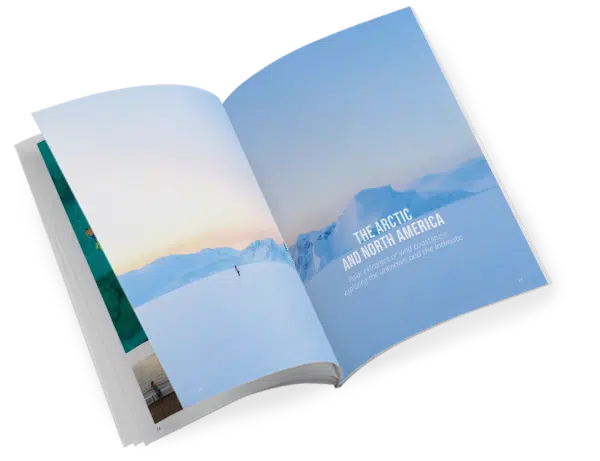Searching for meaning in Greenland
Nicolas Dubreuil has gone from being a lecturer in computer science to an expert in the ice of Greenland, his adoptive home where adventure continues to beckon. ‘Niko’ has been exploring this land full of contrasts for over thirty years on extraordinary expeditions that he never tires of sharing with others.
From research to exploration
Nicolas Dubreuil was 18 when he first encountered the ice. Setting out from Port McNeill, a small coastal town in British Columbia, Canada, he ventured to the cold lands of Alaska with a friend of his parents. This taste of survival in the Far North is one he never forgot.
At the time, the young man was studying computer science in Paris. He went on to complete his studies by becoming a lecturer at Louis Pasteur University in Strasbourg. But the professor-researcher was unable to quell the explorer within, and Nicolas continued to visit the North regularly, embarking on a ski trek in Sweden or a kayaking expedition in Alaska, for example. For Nicolas Dubreuil, there was an obvious link between research and exploration: “The constant thirst for discovery, a certain curiosity and a desire to pass information on are definitely what drove me. University research shaped my spirit as a polar explorer,” he explains.
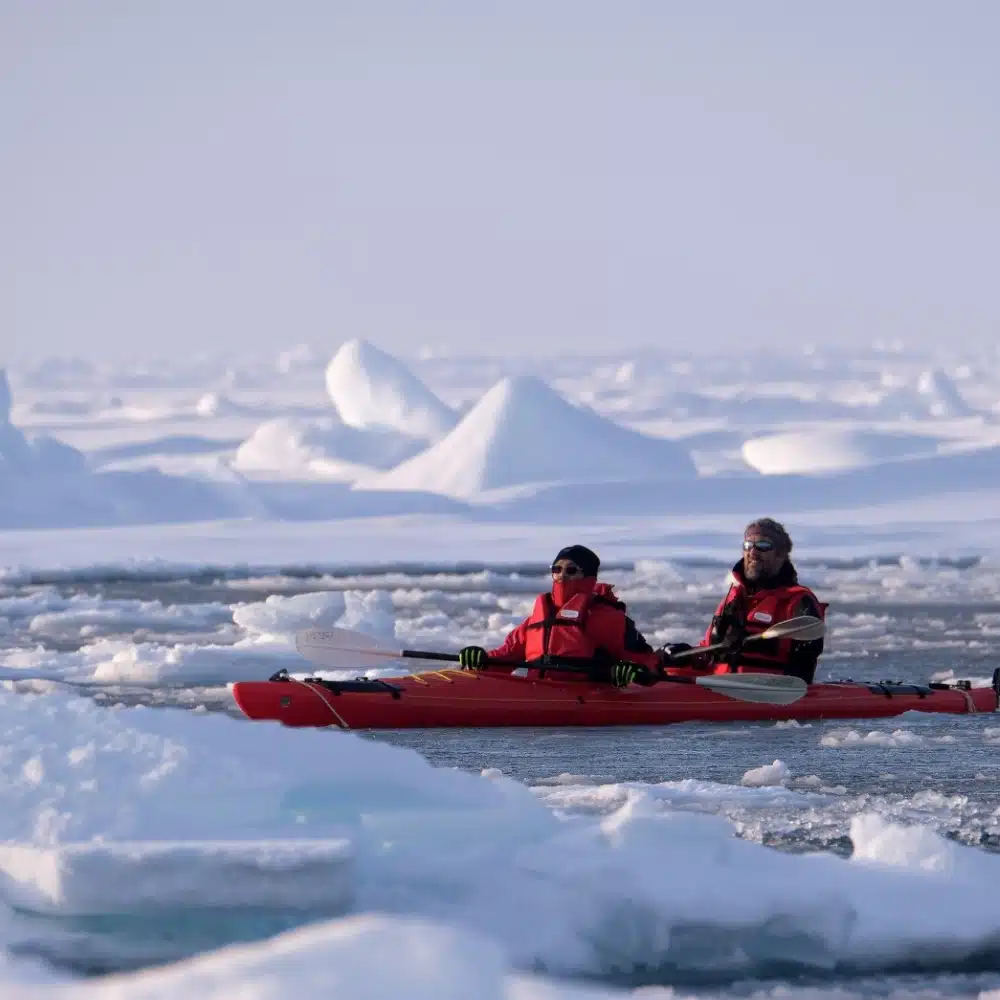
For ten years, Nicolas Dubreuil combined lecture theatres with polar expeditions. “There was quite a lot of ego tied in with all that. The need to prove something. To myself and to others.” It took him several years before he was brave enough to examine the real reasons behind his incessant need to keep returning to these far-off lands.
Cue a fateful day in February 2001, which was to signal the start of a brand new life: “I was on the north coast of Greenland. The sea ice gave way and I fell into the water. I suddenly found myself seized by the cold in the dark, with nothing to hold on to. I thought the end had come. This event transformed my life.” A life that Nicolas Dubreuil owes to Titus, an inhabitant of Upernavik, who was fishing with his family close by at the time. “This man saved my life by risking his own. It is a debt I can never repay. We have remained very close. He has taught me a lot about survival techniques in Greenland, and if I’d had a son, I would have named him after Titus.
“At Upernavik hospital, the Greenlandic doctor who treated me had never known anyone to survive a fall into the sea ice before. My excellent physical and mental health combined with my ability to swim were all vital.”
The indigenous adventure
At the age of 34, Nicolas Dubreuil decided to leave the university for good and embark on a life dedicated to polar exploration. To finance his expeditions, he gave talks about his experiences at conferences, advised scientists and worked as a go-between for film crews, facilitating their progress over these hostile lands. In 2005, he joined the PONANT company as a naturalist guide, before becoming an expedition leader. Far from his ‘ego trip’ explorations of yore, he “found it to be an absolutely incredible educational tool, enabling passengers and indigenous communities to understand and get to know one another.”
“To rethink the world, we first need to understand it. And to gain a better understanding, we need to change the way we explore it.”
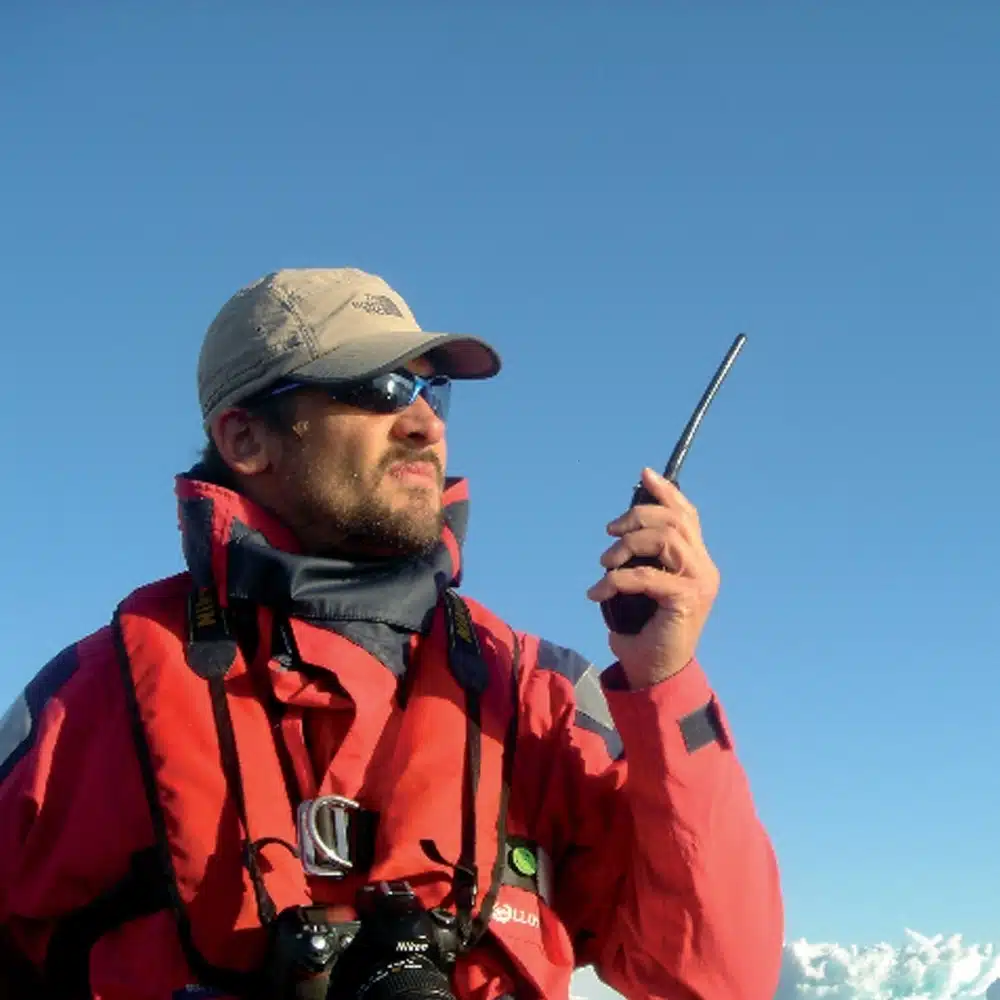
Since his accident, the adventurer has been driven by a deep quest for meaning. It was no longer about being this ‘professor’ explorer with a wealth of knowledge. Nicolas Dubreuil wanted to venture outside his comfort zone and learn all there was to know about this icy kingdom and its inhabitants. So in 2009, he bought a house in Kullorsuaq, a traditional village of 400 staunch hunter-fishermen at the entrance to Melville Bay, in the Upernavik Archipelago on the north-west coast of Greenland.
“At that point, my life took a completely different turn and I began to live the adventure like a native Greenlander. In the village, even though everyone had heard about me on the radio at the time of my accident, no one thought I’d ever come back.”
Through contact with the local population, the man they call ‘Niko’ learned how to harness dogs and drive a sledge, hunt bears and seals, fish for halibut and build a harpoon and kayak. But above all, he learned how to speak Inuktitut, an Eskaleut agglutinative language native to Greenland. This was a precious key for gaining access to people’s homes and, beyond that, venturing to the heart of Inuit culture.
 Find out more about Kullorsuaq
Find out more about Kullorsuaq
Location: Avannaata municipality, the northernmost settlement in the Upernavik Archipelago
Population: 453 (2020)
Distance from Nuuk: 1,175 km
Access by air (very limited): Nuussuaq Heliport and Aappilattoq-Upernavik Heliport
Nearest town: Upernavik
Climate: average temperatures are below zero for nine months of the year
A world apart… that is learning to adapt
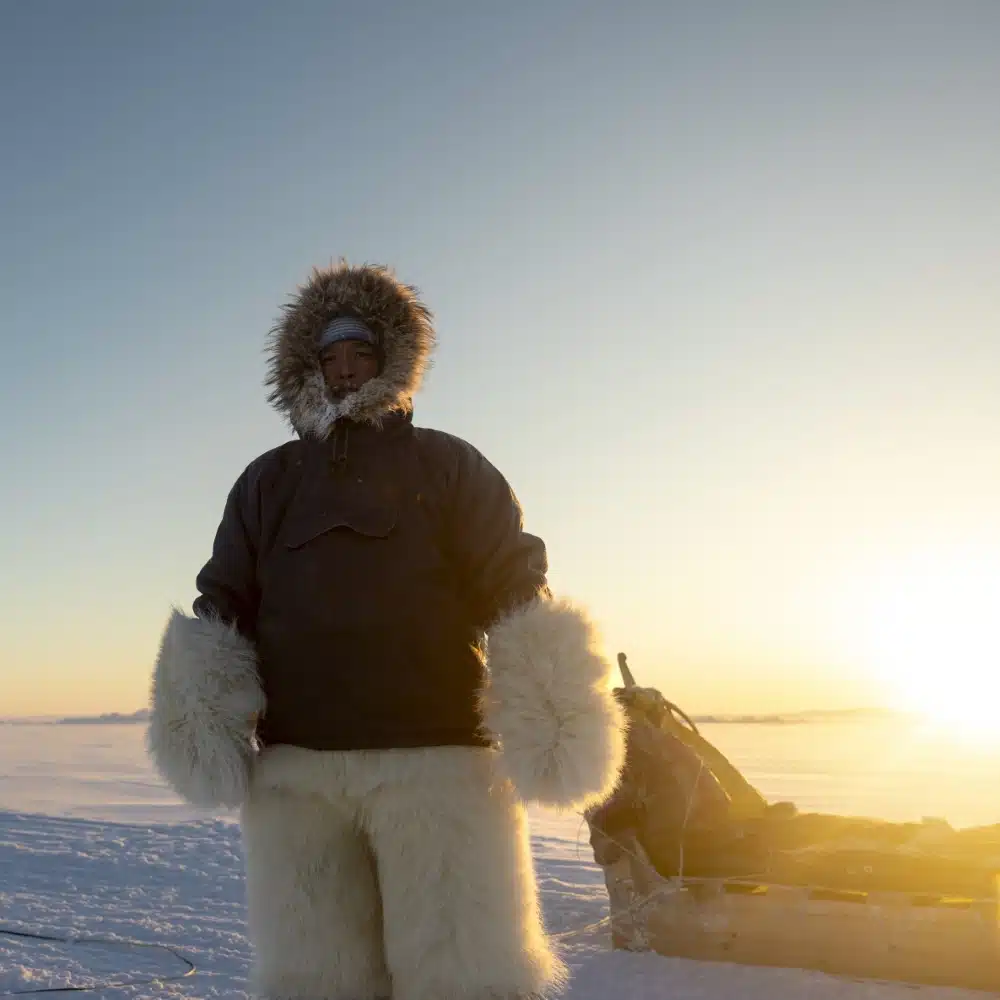
Kullorsuaq remains very isolated. “It’s the Greenland from Paul-Émile Victor’s books!” exclaims the adventurer. “Just imagine: certain scenes depicting traditional life in the museum of Nuuk, the capital of Greenland, are still current today here in Kullorsuaq.” And on this Inuit land where nothing grows, hunting is vital. For sustenance and opportunity though, never for trophies. “If a seal presents itself to a hunter, it’s because nature has chosen to put it in his path.”
“For these animist people, man and nature are one and the same. The word ‘nature’ doesn’t exist in Greenlandic!”
Kullorsuaq may be a world apart that is deeply anchored in its traditions, but its inhabitants have access to the internet, dance to Britney Spears and can reel off the names of footballers from around the world without pausing for breath. “They know a lot more about us than we know about them,” explains Nicolas Dubreuil. “Kullorsuaq is not a museum; it is a living society that is embracing change.” In stark contrast to a ‘Man vs Wild’ Western approach based on domination and control of the environment, the Inuits are accepting, respectful, patient and adaptable.
The power of maybe
‘Imaqa’ is a word that is often used by Greenlanders. It means ‘maybe’. “Everything is ‘imaqa’ in Kullorsuaq,” notes Nicolas Dubreuil, “because everything is dictated by the strong and unpredictable natural world.” A natural world that is both violent and nurturing, and that makes him feel profoundly alive and in his rightful place. To Nicolas, the polar regions seem like safeguards against the impertinence of an overconfident modern Western world.
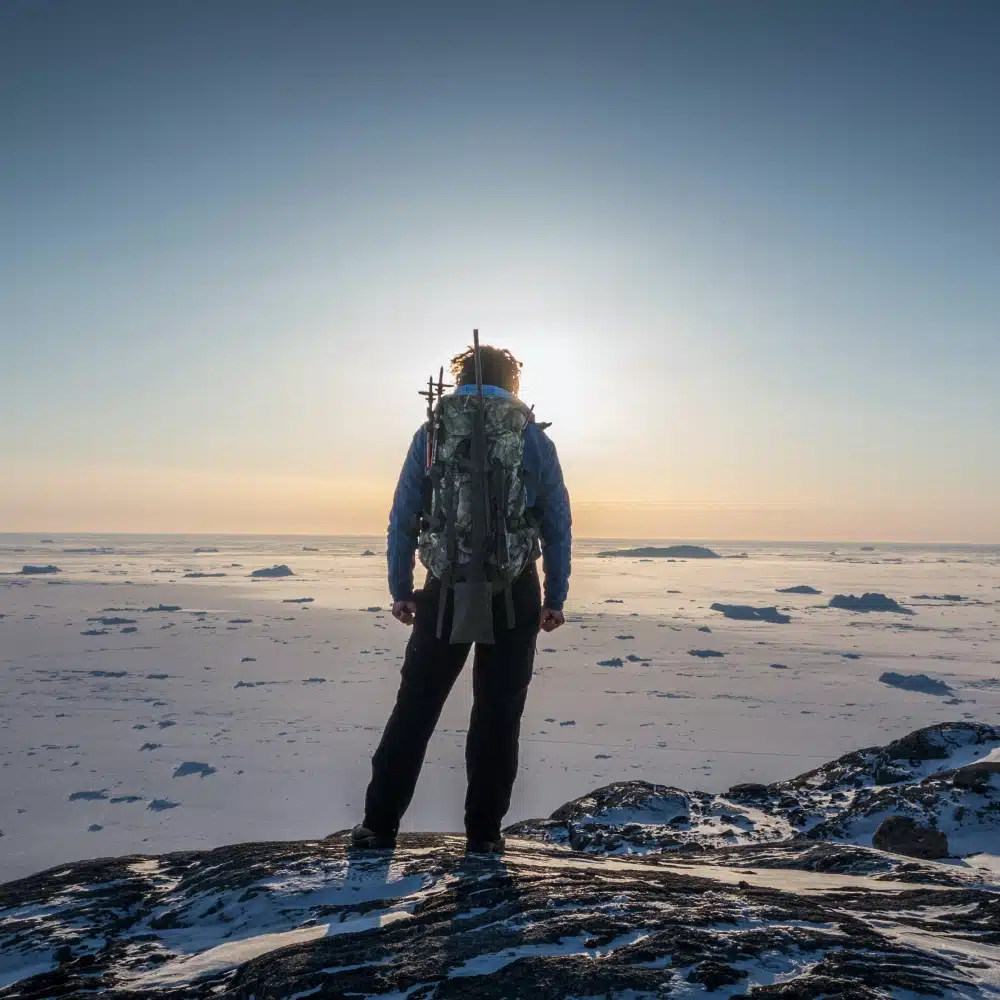
“Silarsuaq sikullu kisimi naagalavoq”
(The only masters are time and ice. Greenlandic saying.)
It is this art of living in the conditional tense and this feeling of letting go that Nicolas Dubreuil wants to convey to others as he embarks on his adventures. Co-founder of SEDNA, a company specialising in polar expeditions, he aims to transform the very notion of travel in the heart of these remote regions.
For Nicolas Dubreuil, this starts with giving local communities a voice. He sees himself as a discreet mediator who is adept at ‘participative observation’, preferring to let guests and visitors come together naturally. It is his way of giving travellers a taste of the incredible feeling of humanity he felt when he first arrived in Kullorsuaq. Teaching them to let go, deconstruct their fantasies and find their place in this all-powerful natural environment.
“We can no longer travel for travel’s sake. Travel needs to have meaning, it needs to be synonymous with something else.”
SEDNA
In 2021, Nicolas Dubreuil joined a group of four people passionate about polar exploration in order to enhance cooperation and promote responsible adventure-based tourism centred on co-construction with indigenous communities and scientific sharing in the polar regions. Together, they set up the SEDNA exploration company.
At the request of the Kullorsuaq community, they organise sledging expeditions in uncharted zones. Polar exploration is not the only aim. The preservation of an endangered culture and its transmission to younger generations are also key.
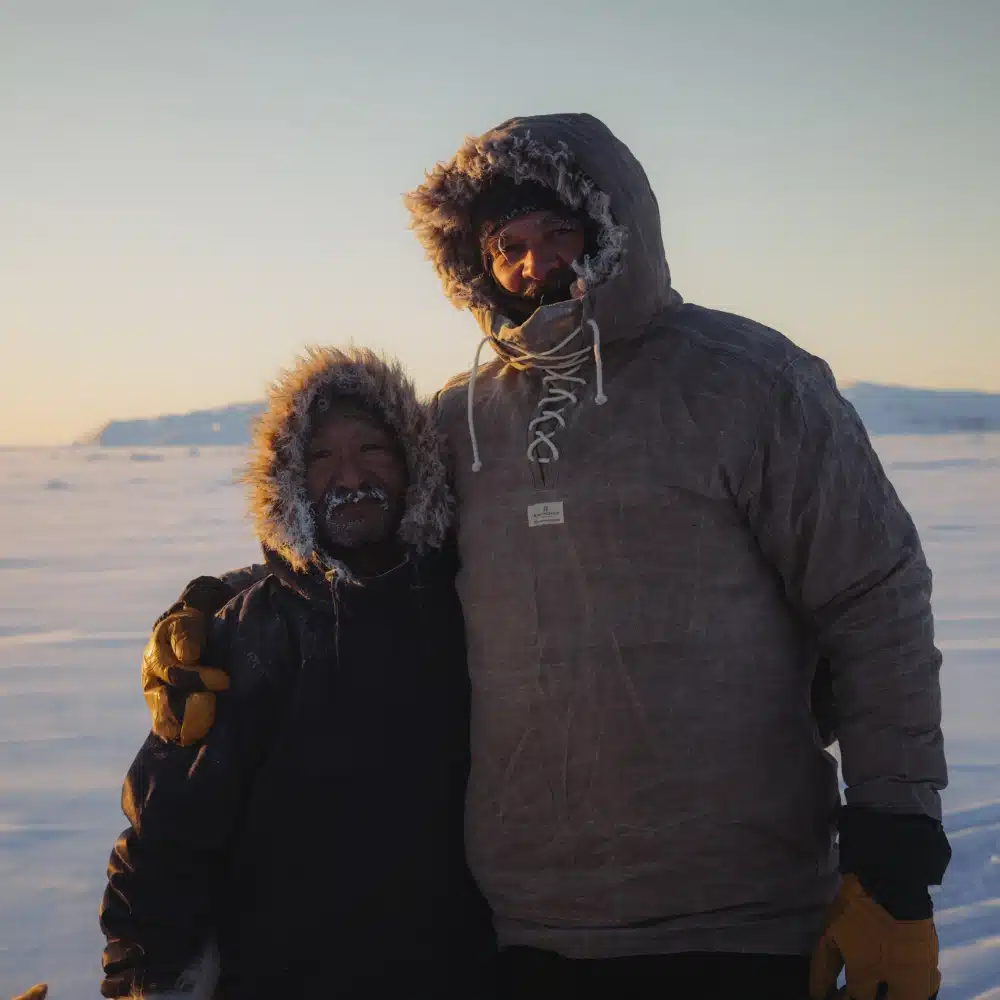
“Greenlanders can read a person’s soul. They are very attentive to the slightest gesture when interacting with someone whose language they don’t speak.”
And for Nicolas Dubreuil, success doesn’t get any more tangible than seeing young Greenlanders purchase new dogs and sleds to retrace the journeys their parents and grandparents took, and thus share their know-how. By striving to maintain this reciprocal openness between two worlds, Nicolas Dubreuil has found “a way to restore a certain sense of pride” among Greenlanders.
Photo credits: ©PONANT/Ian Dawson; © François Lefebvre; © PONANT/Julien Fabro; © Nicolas Dubreuil
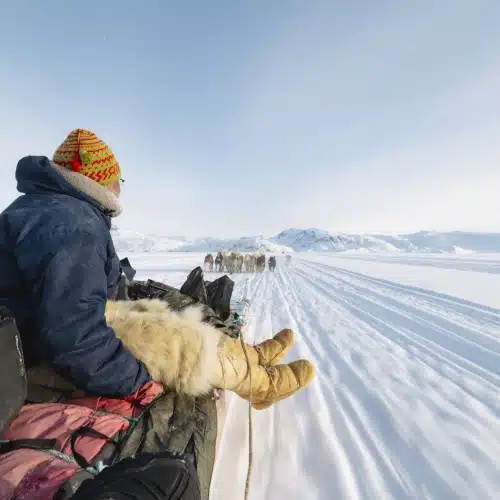
PONANT takes you there
Meet the people who call the Arctic home
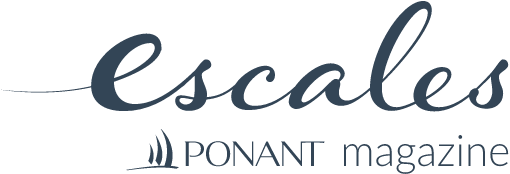
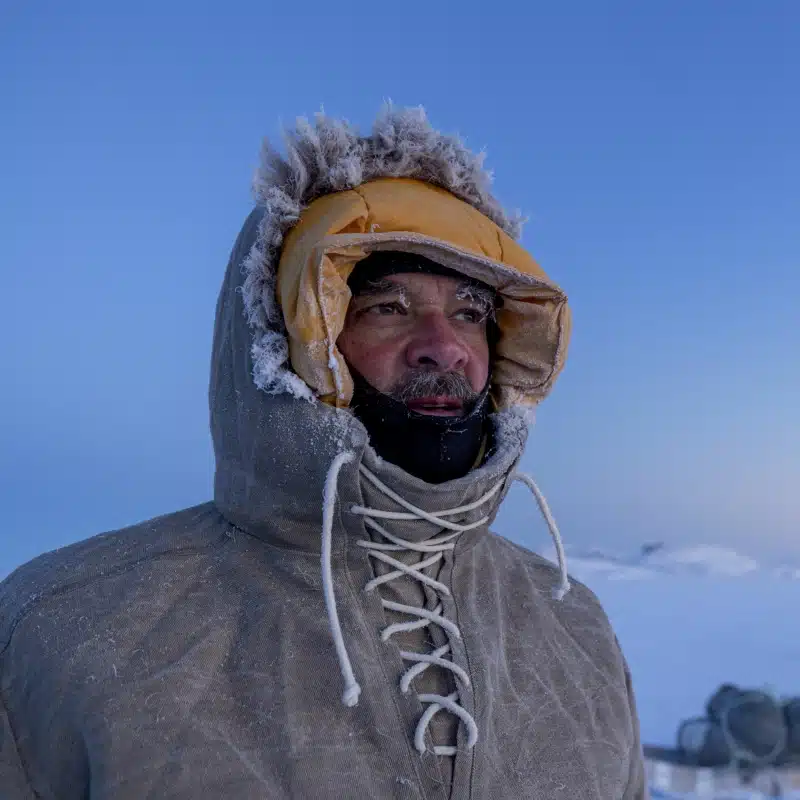
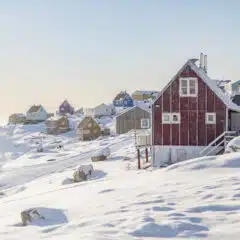 Find out more about Kullorsuaq
Find out more about Kullorsuaq